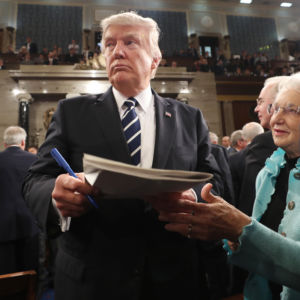President Donald Trump highlighted potential changes in his budget Thursday that would refocus an agency that helps foreign workers.
Trump ran on a populist message centered on helping American workers. The Bureau of International Labor Affairs (ILAB) helps ensure domestic and foreign workers are treated fairly worldwide. The proposed budget for next year cuts millions from the agency while also prioritizing domestic workers during trade agreements.
The budget “focuses the Bureau of International Labor Affairs on ensuring that U.S. trade agreements are fair for American workers. The Budget eliminates the Bureau’s largely noncompetitive and unproven grant funding, which would save at least $60 million from the 2017 annualized CR level.”
The ILAB was formed in 1947 as an operating unit within the Department of Labor (DOL). It runs numerous programs aimed at preventing child labor, human trafficking, and forced labor worldwide. It also provides other countries technical assistance on issues like worker rights, healthcare, and working conditions.
“With so few details provided, it is hard to know how much of a change Trump is proposing to the Bureau of International Labor Affairs,” Center for American Progress Action Fund senior adviser David Madland told InsideSources. “But it appears Trump is presenting a false choice between protecting American workers and encouraging fair standards in other countries.”
The ILAB was granted $86,125,000 in discretionary spending last year. The president promised to help domestic workers by making sure they’re prioritized in trade deals and immigration reform. He has been particularly critical of the now defeated Trans-Pacific Partnership.
“We can and should do both,” Madland said. “With the radical budget cuts Trump has put forth, the agency is unlikely to do either very well. American workers benefit from fair trade deals and by ensuring that other countries promote high standards that don’t undercut ours.”
The ILAB grant program is designed to advance workers’ rights and livelihoods worldwide. The agency has partnered with nongovernmental organizations, universities, and various other institutions. The Government Accountability Office (GAO) found in a 2014 report the grant program has financial oversight problems.
“ILAB’s mission is to improve global working conditions, raise living standards, protect workers’ ability to exercise their rights, and address the workplace exploitation of children and other vulnerable populations,” ILAB notes in its mission statement. “Our efforts help to ensure a fair playing field for American workers and contribute to stronger export markets for goods made in the United States.”
The ILAB is not alone as the proposed budget requests the labor department to make $9.6 billion in total cuts. The cuts represent a 21 percent decrease from the last budget. Trump still needs a confirmed labor secretary, as the process has faced several setbacks.
“If you care about U.S. workers it makes no sense to cut a fifth of the budget of the key agency that protects workers from being killed on the job, that protects their pay and benefits, that helps them get retrained after job loss and provides unemployment benefits if they can’t find a job,” Economic Policy Institute researcher Heidi Shierholz writes. “Working people deserve to work in a safe environment and get paid the wages and overtime they are owed.”
The proposed budget call for cuts across the federal government. The budget does increase defense spending by $54 billion next year. The administration believes the increased defense budget will be offset by reductions elsewhere.
“President Trump’s proposed budget is the clearest sign yet that he is moving forward with his efforts to uproot waste and drastically shrink the federal government,” Competitive Enterprise Institute Vice President for Strategy Iain Murray said in a statement. “The President’s budget proposal is just the starting point.”
Murray adds that policymakers should start focusing on tax reform too. He also notes they should work to further eliminate federal programs, and spending that limit economic freedom. Trump has been fiscally conservative with some policies but has also pushed for increased spending in areas like infrastructure, defense, and border security.
The White House and labor department did not respond to requests for comment.

